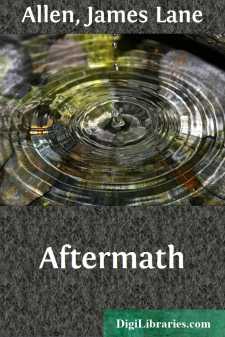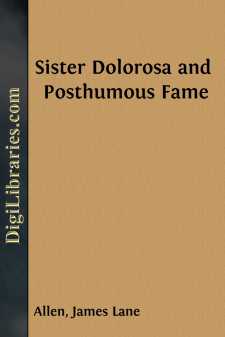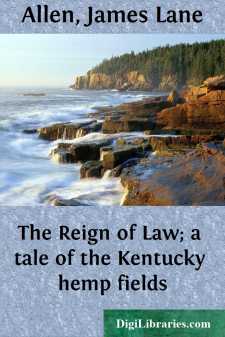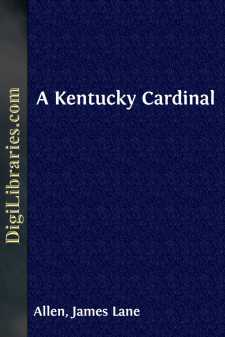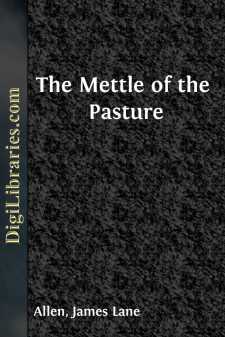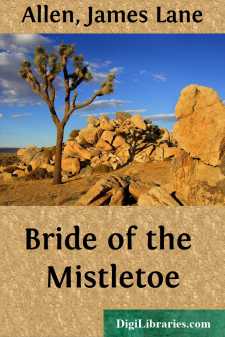Categories
- Antiques & Collectibles 13
- Architecture 36
- Art 48
- Bibles 22
- Biography & Autobiography 813
- Body, Mind & Spirit 142
- Business & Economics 28
- Children's Books 17
- Children's Fiction 14
- Computers 4
- Cooking 94
- Crafts & Hobbies 4
- Drama 346
- Education 46
- Family & Relationships 57
- Fiction 11829
- Games 19
- Gardening 17
- Health & Fitness 34
- History 1377
- House & Home 1
- Humor 147
- Juvenile Fiction 1873
- Juvenile Nonfiction 202
- Language Arts & Disciplines 88
- Law 16
- Literary Collections 686
- Literary Criticism 179
- Mathematics 13
- Medical 41
- Music 40
- Nature 179
- Non-Classifiable 1768
- Performing Arts 7
- Periodicals 1453
- Philosophy 64
- Photography 2
- Poetry 896
- Political Science 203
- Psychology 42
- Reference 154
- Religion 513
- Science 126
- Self-Help 84
- Social Science 81
- Sports & Recreation 34
- Study Aids 3
- Technology & Engineering 59
- Transportation 23
- Travel 463
- True Crime 29
Aftermath
by: James Lane Allen
Description:
Excerpt
I
I was happily at work this morning among my butterbeans—a vegetable of solid merit and of a far greater suitableness to my palate than such bovine watery growths as the squash and the beet. Georgiana came to her garden window and stood watching me.
"You work those butterbeans as though you loved them," she said, scornfully.
"I do love them. I love all vines."
"Are you cultivating them as vines or as vegetables?"
"It makes no difference to nature."
"Do you expect me to be a vine when we are married?"
"I hope you'll not turn out a mere vegetable. How should you like to be my Virginia-creeper?"
"And what would you be?"
"Well, what would you like? A sort of honeysuckle frame?"
"Oh, anything! Only support me and give me plenty of room to bloom."
I do not always reply to Georgiana, though I always could if I chose.
Whenever I remain silent about anything she changes the subject.
"Did you know that Sylvia once wrote a poem on a vegetable?"
"I did not."
"You don't speak as though you cared."
"You must know how deeply interested I am."
"Then why don't you ask to see the poem?"
"Was it on butterbeans?"
"The idea! Sylvia has better taste."
"I suppose I'd better look into this poem."
"You are not to laugh at it!"
"I shall weep."
"No; you are not to weep. Promise."
"What am I to promise?"
"That you will read it unmoved."
"I do promise—solemnly, cheerfully."
"Then come and get it."
I went over and stood under the window. Georgiana soon returned and dropped down to me a piece of writing-paper.
"Sylvia wrote it before she began to think about the boys."
"It must be a very early poem."
"It is; and this is the only copy; please don't lose it."
"Then I think you ought to take it back at once. Let me beg of you not to risk it—" But she was gone; and I turned to my arbor and sat down to read Sylvia's poem, which I found to be inscribed to "The Potato," and to run as follows:
"What on this wide earth
That is made or does by nature grow
Is more homely yet more beautiful
Than the useful Potato?
"What would this world full of people do,
Rich and poor, high and low,
Were it not for this little-thought-of
But very necessary Potato?
"True, 'tis homely to look on,
Nothing pretty even in its blow,
But it will bear acquaintance,
This useful Potato.
"For when it is cooked and opened
It's so white and mellow,
You forget it ever was homely,
This useful Potato.
"On the whole it is a very plain plant,
Makes no conspicuous show,
But the internal appearance is lovely
Of the unostentatious Potato.
"On the land or on the sea,
Wherever we may go,
We are always glad to welcome
The sound Potato."[*]
[*]The elder Miss Cobb was wrong in thinking this poem Sylvia's. It was extant at the time over the signature of another writer, whose authorship is not known to have been questioned. Miss Sylvia perhaps copied it out of admiration, or as a model for her own use....


